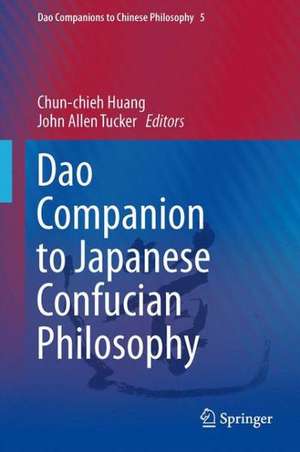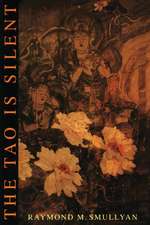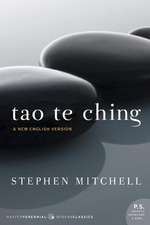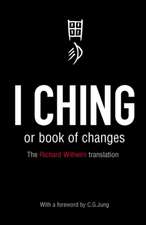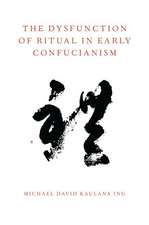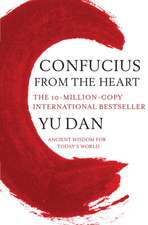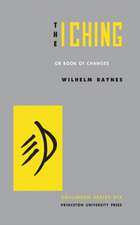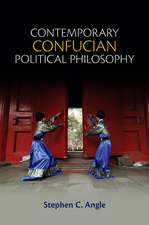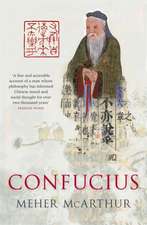Dao Companion to Japanese Confucian Philosophy: Dao Companions to Chinese Philosophy, cartea 5
Editat de Chun-Chieh Huang, John Allen Tuckeren Limba Engleză Hardback – 22 sep 2014
The Dao Companion to Japanese Confucian Philosophy makes a significant contribution to the Dao handbook series, and equally to the field of Japanese philosophy. This new volume including original philosophical studies will be a major contribution to the study of Confucianism generally and Japanese philosophy in particular.
| Toate formatele și edițiile | Preț | Express |
|---|---|---|
| Paperback (1) | 647.59 lei 6-8 săpt. | |
| SPRINGER NETHERLANDS – 10 sep 2016 | 647.59 lei 6-8 săpt. | |
| Hardback (1) | 653.98 lei 6-8 săpt. | |
| SPRINGER NETHERLANDS – 22 sep 2014 | 653.98 lei 6-8 săpt. |
Din seria Dao Companions to Chinese Philosophy
- 18%
 Preț: 1827.00 lei
Preț: 1827.00 lei - 18%
 Preț: 954.93 lei
Preț: 954.93 lei - 18%
 Preț: 1011.77 lei
Preț: 1011.77 lei - 18%
 Preț: 1127.15 lei
Preț: 1127.15 lei - 18%
 Preț: 1033.23 lei
Preț: 1033.23 lei - 18%
 Preț: 956.03 lei
Preț: 956.03 lei - 18%
 Preț: 1131.40 lei
Preț: 1131.40 lei - 18%
 Preț: 969.93 lei
Preț: 969.93 lei - 24%
 Preț: 688.85 lei
Preț: 688.85 lei - 18%
 Preț: 807.96 lei
Preț: 807.96 lei - 18%
 Preț: 1242.35 lei
Preț: 1242.35 lei - 24%
 Preț: 784.84 lei
Preț: 784.84 lei - 18%
 Preț: 1059.70 lei
Preț: 1059.70 lei - 18%
 Preț: 949.06 lei
Preț: 949.06 lei - 24%
 Preț: 1725.19 lei
Preț: 1725.19 lei - 18%
 Preț: 1128.08 lei
Preț: 1128.08 lei - 18%
 Preț: 1408.71 lei
Preț: 1408.71 lei - 18%
 Preț: 1121.62 lei
Preț: 1121.62 lei
Preț: 653.98 lei
Preț vechi: 769.39 lei
-15% Nou
Puncte Express: 981
Preț estimativ în valută:
125.13€ • 130.66$ • 103.33£
125.13€ • 130.66$ • 103.33£
Carte tipărită la comandă
Livrare economică 15-29 aprilie
Preluare comenzi: 021 569.72.76
Specificații
ISBN-13: 9789048129201
ISBN-10: 9048129206
Pagini: 500
Ilustrații: XI, 429 p.
Dimensiuni: 155 x 235 x 30 mm
Greutate: 0.79 kg
Ediția:2014
Editura: SPRINGER NETHERLANDS
Colecția Springer
Seria Dao Companions to Chinese Philosophy
Locul publicării:Dordrecht, Netherlands
ISBN-10: 9048129206
Pagini: 500
Ilustrații: XI, 429 p.
Dimensiuni: 155 x 235 x 30 mm
Greutate: 0.79 kg
Ediția:2014
Editura: SPRINGER NETHERLANDS
Colecția Springer
Seria Dao Companions to Chinese Philosophy
Locul publicării:Dordrecht, Netherlands
Public țintă
ResearchCuprins
Chapter 1: Introduction; Huang Chun-chieh and John Allen Tucker.- Chapter 2: The Meanings of Words and Confucian Political Philosophy: A Study of Matsunaga Sekigo’s Ethics; John Allen Tucker.- Chapter 3: Spirits, Gods, and Heaven in Confucian Thought; W. J. Boot.- Chapter 4: Making Destiny in the Kingdom of Ryuku; Gregory Smits.- Chapter 5: The Somaticization of Learning in Edo Confucianism: The Rejection of Mind-Body Dualism in the Thought of Kaibara Ekken; Tsujimoto Masashi (translated by Barry D. Steben).- Chapter 6: Ogyū Sorai: Confucian Conservative Reformer: From Journey to Kai to Discourse on Government; Olof G. Lidin.- Chapter 7: The Philosophical Moment Between Ogyū Sorai and Kaiho Seiryō: Indigenous Modernity in the Political Theories of Eighteenth-Century Japan? Olivier Ansart.- Chapter 8: Human Nature and the Way in the Philosophy of Dazai Shundai; Peter Flueckiger.- Chapter 9: Kokugaku Critiques of Confucianism and Chinese Culture; Peter Nosco.- Chapter 10: Saints as Sinners: Andō Shōeki’s Back-to-Nature Critique of the Saints, Confucian and Otherwise; Jacques Joly.- Chapter 11: Moral and Philosophical Idealism in Late-Edo Confucian Thought: Ōshio Chūsai and the Working Out of his “Great Aspiration”; Barry D. Steben.- Chapter 12: Divination and Meiji Politics: A Reading of Takashima Kaemon’s Judgment on the Yijing; Wai-Ming Ng.- Chapter 13: “Orthodoxy” and “Legitimacy” in the Yamazaki Ansai School; Maruyama Masao (translated by Barry D. Steben).- Chapter 14: Zhu Xi and “Zhu Xi-ism:” Toward a Critical Perspective on the Ansai School; Koyasu Nobukuni (translated by Barry D. Steben).
Notă biografică
Chun-chieh Huang completed his PhD at the University of Washington in 1980. He is currently the Distinguished Professor of General Education, Dean of the Institute for Advanced Studies in Humanities and Social Sciences, and Director of the Program of East Asian Confucianisms at National Taiwan University in Taipei, Taiwan. Huang is also a Research Fellow at the Academia Sinica’s Institute of Chinese Literature and Philosophy. He is past president of the Society for Cultural Interaction in East Asia. Huang has been awarded the Wang Fellowship in Chinese Studies (1988), Outstanding Scholar Award (1997-2002), the Hu Shih Chair Professorship (2005-6), the Sun Yatsen Academic Award (2006), the National Taiwan University Award for the best book (2006, 2007, 2010), the National Taiwan University Award for the best article (2008, 2009), and the National Award for Teaching Excellence in General Education by the Taiwan Ministry of Education (2011).
John A. Tucker completed his PhD at Columbia University in 1990. After teaching at the University of North Florida in Jacksonville, Florida from 1990-2000, Tucker joined the History Department at East Carolina University in Greenville, North Carolina. He is a full professor of history, director of the Asian Studies Program, and serves as East Carolina’s University historian. He also directs the Thomas Harriot College of Arts and Sciences’ Voyages of Discovery Lecture Series. He has been a visiting researcher at the Institute for Research in the Humanities and Social Sciences at Kyoto University; a visiting researcher at Nanzan University, Nagoya; and a visiting research scholar at National Taiwan University. Tucker’s specialization is in the history of Japanese and East Asian Confucian thought. He is currently working on a study of the Akō vendetta in Japanese intellectual history and another study of the Confucian thought of Shibusawa Eiichi.
John A. Tucker completed his PhD at Columbia University in 1990. After teaching at the University of North Florida in Jacksonville, Florida from 1990-2000, Tucker joined the History Department at East Carolina University in Greenville, North Carolina. He is a full professor of history, director of the Asian Studies Program, and serves as East Carolina’s University historian. He also directs the Thomas Harriot College of Arts and Sciences’ Voyages of Discovery Lecture Series. He has been a visiting researcher at the Institute for Research in the Humanities and Social Sciences at Kyoto University; a visiting researcher at Nanzan University, Nagoya; and a visiting research scholar at National Taiwan University. Tucker’s specialization is in the history of Japanese and East Asian Confucian thought. He is currently working on a study of the Akō vendetta in Japanese intellectual history and another study of the Confucian thought of Shibusawa Eiichi.
Textul de pe ultima copertă
This volume features in-depth philosophical analyses of major Japanese Confucian philosophers as well as themes and topics addressed in their writings. Its main historical focus is the early-modern period (1600-1868), when much original Confucian philosophizing occurred. Written by scholars from the United States, Canada, Europe, Australia, Japan, and China and eclectic in methodology and disciplinary approach, this anthology seeks to advance new multidimensional studies of Japanese Confucian philosophy for English language readers. It presents essays that focus on Japanese Confucianism, while including topics related to Buddhism, Shintō, Nativism, and even Andō Shōeki 安藤昌益 (1703-1762), one of the most vehement critics of Confucianism in all of East Asia. The book builds on the premise that Japanese Confucian philosophy consists in the ongoing engagement in critical, self-reflective discussions of and speculative theorizing about ethics, epistemology, metaphysics, political theory, and spiritual problems, as well as aesthetics, cosmology, and ontology.
Caracteristici
Makes a significant contribution to the study of Confucianism and Japanese philosophy Is the first comprehensive publication in English on Japanese Confucian Philosophy in decades Highlights the Japanese development and interpretation of Confucian ideas Analyzes Japanese Confucian philosophy within East Asian and global contexts
